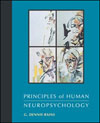Major psychiatric disorders can severely disrupt behavior and cause enormous suffering. They are also quite common; we all know someone afflicted with a serious psychiatric disorder, perhaps someone very close to us. In this chapter we examine some of the evidence indicating that neurobiological factors play a major role in at least some forms of psychopathology. We begin with a brief discussion concerning problems confronted in attempts to formulate a satisfactory definition of psychopathology. One of these problems is the tension between biological and psychological approaches to its understanding. We will see that how we define psychopathology has important implications for our attitude toward these disorders and their treatment. In subsequent sections we examine biological factors in schizophrenia, mood disorders, anxiety disorders, sociopathy, and degenerative dementing disorders, including Alzheimer's disease. We will pay particular attention to schizophrenia, both because of the importance of the disorder and because a wide range of evidence regarding biological factors in schizophrenia has emerged in recent years. We end with a considerationof problems in the interpretation of biological factors in psychopathology. |



 2002 McGraw-Hill Higher Education
2002 McGraw-Hill Higher Education